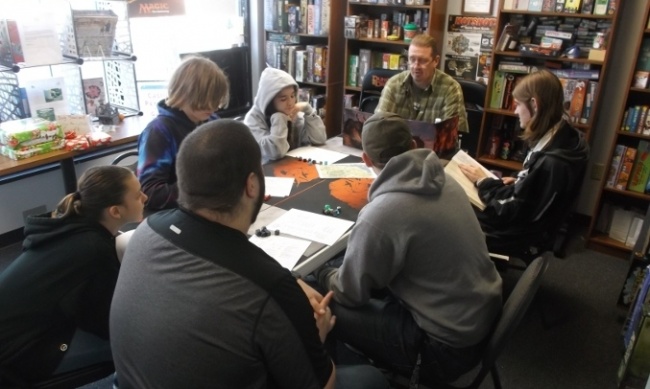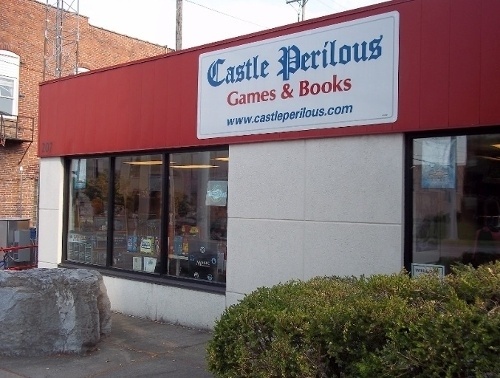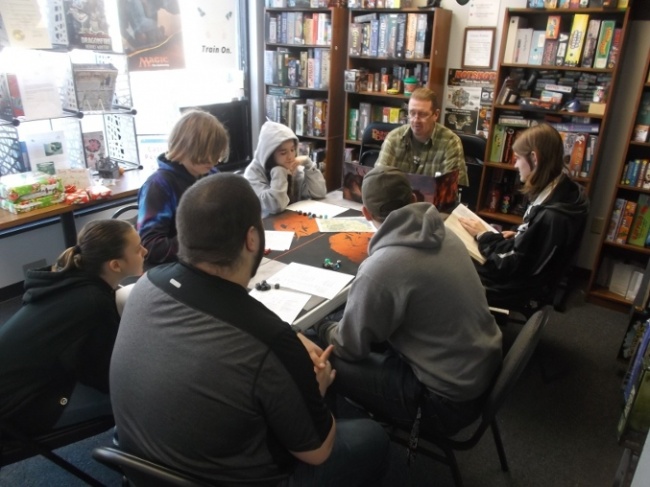Rolling for Initiative is a weekly column by Scott Thorne, PhD, owner of Castle Perilous Games & Books in Carbondale, Illinois and instructor in marketing at Southeast Missouri State University. This week, Thorne looks at the reasons to run in-store Dungeons & Dragons for younger players.
One thing we have noticed over the past year is a lot more interest by middle schoolers and teenagers in playing RPGs. I happened to walk into one of the Fantasy Shop locations in St. Louis this past week and in the back corner were two tables pulled together with a good dozen or so middle schoolers clustered around one parent who was doing a yeoman’s job of responding to the players who often talked over each other and wanted to do what they wanted to do right now. Surprisingly, it was not a large game of Dungeons & Dragons but a superhero campaign using the Savage Worlds rules. Other RPGs such as Adventure Maximus and No Thank You Evil would work as well.
Over half the players at our weekly Wednesday night D&D sessions are teenagers and younger, and the game has proven so popular that like some other stores we have started up a weekly D&D session just for middle schoolers. I have heard from other stores that run weekly D&D sessions for players 7 to high school with much success and even a waiting list of younger players waiting to take a seat at the table.
Why, if you are a store, would you want to run or have someone run a D&D campaign for younger players?
Store Loyalty. One of the great things about running an ongoing D&D campaign is that you bring a group of players into the store every week. They are coming back to your place, instead of going someplace else and developing the feeling of the "third place" that some bars and coffee shops work to develop. I have players who have played in the store since they were in elementary school and would not think of shopping anywhere else.
Parental Support. Parents are ALWAYS looking for activities in which their children can participate and if those activities have educational benefits, they view that as a bonus. Given that Dungeons & Dragons helps with reading and math, as well as strategic thinking and socialization, pointing that out to them helps overcome the negativity that can come with having D&D viewed as "just a game." Once parents realize that, they become your biggest supporters.
Money. A number of stores make sure to monetize their D&D sessions by charging players for a seat at the table. This could be a straight fee, a certain level of purchase required or the purchase of a certain amount of store credit. One of the great things about kids this age is that generally they are not going to be shopping online. Since most of them tend to lack patience, as least in purchasing items, they often "want it now" and will spend their money in your store rather than waiting to go somewhere else. Their parents, due to the concept of reciprocity, are going to spend more money on their kid in your store, since they feel they owe you for entertaining their kid. That is why I am not a big fan of table fees since they tend to destroy the feeling of reciprocity, replacing it with a "fee for service" attitude instead, but some stores I know have great success with them.
One of the big problems the comic industry has is recruiting its next generation of readers as younger readers. They are not trained to purchase paper comic books. The interest young players have in D&D proves a great way for the game industry to create its next generation of customers.
The opinions expressed in this column are solely those of the writer, and do not necessarily reflect the views of the editorial staff of ICv2.com.

Column by Scott Thorne
Posted by Scott Thorne on January 29, 2018 @ 12:38 am CT




